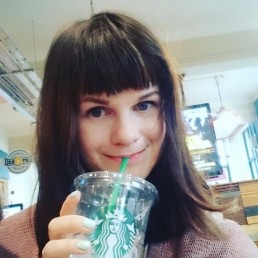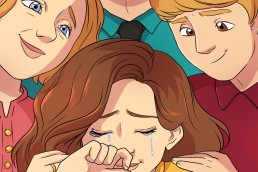By Jess Kershaw
Photography by Martha Domingue, via Unsplash
Content Warning: mentions of self-harm
I am twenty years old, and the GP’s receptionist is telling me that they only have emergency appointments left: one, tomorrow, at half ten.
I pause, with my tongue thick in my mouth and my shoulders scabbing over and I say, no, don’t worry, it’s not an emergency. Halfway to the door, the bright waiting room bulbs bearing down on me, I stop and shake my head. I imagine my friend, wide-eyed with concern, as I tell her hide the knives, hide them, I can’t look at them. I remember the words in my throat: I think I’m going to hurt myself. The brain has a wonderful way of papering over the past, soothing you, saying that your trauma was not all that bad. And by wonderful I mean self-destructive and cruel. Imagine climbing a mountain, arriving with hands bleeding and feet sore, then getting shoved down the other side, told to scale it once more — only you can’t recall the way.
I am twenty years old, and I am lucky, because earlier that day my mother was on the phone to me, saying that I need help. I am lucky, because I was brought up by a mother who never made me think that a head full of horror was my fault; it’s a neuro-chemical glitch, and just like I would go to A&E if my leg suddenly dropped off, I know that I should go to the GP for this.
I turn back around, on the thin navy carpet, and I book the appointment, and the next day I am seen by a kind doctor with warm eyes. I cry, and it feels like squeezing pus from an infected wound, and I get my first prescription for sertraline, and I start climbing that mountain again.
I am lucky. Once I did not eat for two days and cut my shoulders to ribbons with my leg razor, and once I fantasised about upending a just-boiled kettle over my hands just to feel something through the thick grey haze of depression; and I am terribly, profoundly lucky, because I have friends and family to support me, and when I was twenty and vulnerable there was a doctor who listened to me.
I am lucky, because increasingly success stories like mine — and yes, I am a success story; I am here, breathing and often-happy and alive — could be rare. Mental health services in our country are falling apart, and in a system that is meant to help people like me, we must be our own advocates — at a time when we have never felt less like advocating. I am lucky, because this brief list is the sum total of my bad experiences with medical care:
— the GP who, as I talked through my intrusive thoughts (which are haunting, heartbreaking) said yes, yes I know what OCD is — interrupting me with a wave of a hand.
— the GP who told my that my inability to orgasm, something that made me feel broken and useless — a failure of a woman, a failure as a sexual being — was not a medical issue, no, no, you don’t need a doctor for that. Curt. Dismissive. Her eyes flickered over me, briefly, cataloguing me (I felt) as silly little girl who thinks that her bad sex life is a medical condition.
In those cases, I didn’t blame the GP – not even when they were curt with me, or sharp, or seemed dismissive. How could I blame them, when they face decreasing appointment slots, more patients, fewer resources? I worked for the NHS as a Healthcare Assistant, and in that time I saw good people — compassionate, kind people — have bad days and snap at patients. Worked to the fraying point, on too-long hours and not-enough pay: even a saint would suffer from compassion fatigue. Over a third of GPs are ‘dissatisfied’ with the amount of time they spend with a patient.
It’s getting worse. Brexit isn’t just costing us our dignity as a nation, it’s costing us our healthcare professionals. According to the NHS ombudsman, the number of mental health nurses fell 13% between 2009 and 2017, and England’s 53 mental health trusts are short of about 10% of staff. Jeremy Hunt had the temerity to rebuke inpatient units for the increasing suicide rate, saying that he would ‘leave no stone unturned’. Here’s the thing though: in order to get access to specialist services patients often have to be at crisis point. Friends of mine haven’t been put on waiting lists because they have been deemed ‘too well’. Too sane to be treated. And so when they eventually actually are at crisis point, they are in trouble because they need help then and there and instead they face six months before they see a therapist.
Here’s the thing though: in order to get access to specialist services patients often have to be at crisis point. Friends of mine haven’t been put on waiting lists because they have been deemed ‘too well’. Too sane to be treated. And so when they eventually actually are at crisis point, they are in trouble because they need help then and there and instead they face six months before they see a therapist.
People are ignored, untreated, dismissed at their most vulnerable points; they fill out the same questionnaire again and again; or they never make it to a GP in the first place, because mental health problems can be a vicious, isolating animal, biting your fingers every time you reach out for help. Making that first appointment, saying I cannot cope or I have been having thoughts and they scare me takes a degree of incredible bravery. And yet that appointment doesn’t magically make things better, because the resources to help are not there. The Royal College of General Practitioners reports that nine out of ten people with mental health problems are managed in primary care, and yet most GPs do not include a rotation in mental health as part of their training. Professor Ian Goodyer said that they would have ‘insufficient background knowledge’ to identify mental health issues.
However they try and dress it up, the government has cut funding for mental health services. An analysis by the Royal College of Psychiatrists reports that 62% of trusts reported lower income at the end of 2016-2017 than the amount for 2011-2012. Even given the supposed increased in spending – ‘record’, according to Mr Jeremy Hunt – the total amount of income mental health trusts receive is £105m less than 2011-2012. Waiting lists stretch on for months. For some people, that means that help arrives too late — or the help offered is completely inappropriate. And people are dying.
In March 2018, the NHS ombudsman, Rob Behrens, produced a report that analysed more than 200 complaints about NHS mental health care. One of the cases is that of Ms J, who had a fatal reaction called neuroleptic malignant syndrome (NMS), to being prescribed an anti-psychotic drug for a psychotic episode she was having. Her physical symptoms were dismissed. She did not have to die, but she did. Awareness of NMS is poor amongst healthcare professionals and health practitioners; the symptoms are vague, and often resemble other conditions. Extra education is needed. But that costs money.
Here’s another example: young people are suffering from a lack of early intervention. In an article in the Journal of Public Mental Health, researchers found that young people who have contact with mental health services in the community and in clinic have significantly less chance of suffering from clinical depression later in their adolescence than those with equivalent difficulties who did not receive treatment. The kids who aren’t getting the help they need now could be the victims on tomorrow’s news.
So here is the part of the article where I am meant to say something along the lines of: if you recognise your own struggles in mine, reach out for help! After Kate Spade’s suicide, there were a flurry of tweets about reaching out.
So, I’m meant to say something along the lines of: here is what you can say/do with your friends with mental health issues; here is how to help them. But I am afraid that it is not that easy. Like I said at the start, I am lucky. My brain may be a cauldron of maladaptive coping mechanisms and childhood trauma and faulty neurochemicals; but I am, more or less, functioning; I am middle-class and white, and this brings with it a certain privilege; I know the system, and I have a family who can help me; and who also, in their turn, know the system, and understand what I am going through.
I’ll break it down. I’m white. There is a racial component to the way people access mental health care. People from an ethnic minority are four times more likely to be sectioned. One study of 287 women found that all groups of black patients and white non-British patients were more likely to have been compulsorily admitted than white British patients; white-other, black African and black-other groups were more likely to have been in contact with the police. Mental health stigma overlaps and interacts with race – this is not to say that white people are exempt from the stigma associated with mental health issues, only that we do not have to deal with the attendant racial prejudice that can affect non-white sufferers.
I am middle class. There are people whose mental health problems are just one part of a network of challenges in their lives: they are clinically depressed, yes, but they still have to apply for job after job, or their benefits will be cut and their children will starve. ‘Self-care’ tips for them are patronising at best, and downright cruel at worst — have a bath, says Cosmo, but what if your water has been cut off?
I have run out of patience for the people who post meaningless well-wishing messages on social media, but turn around and vote for politicians who tear apart our NHS, using the meagre savings to offer tax-cuts to the upper-middle-class, or to fund some ridiculous, reactionary Brexit policy.
I have run out of patience for the people who post meaningless well-wishing messages on social media, but turn around and vote for politicians who tear apart our NHS, using the meagre savings to offer tax-cuts to the upper-middle-class, or to fund some ridiculous, reactionary Brexit policy. In England, the leading cause of death in men aged between 5 and 49 is suicide; in women, it is the leading cause of death for those aged 5-34. And yet it isn’t a priority. The government call it one, but actions speak louder than words, and their actions demonstrate that they do not care.
I am sick to the back teeth of people who say have you tried yoga, rather than those meds you are hooked on. My meds keep my intrusive thoughts to a simmering froth, rather than a boiling nightmare, so I’ll hang onto those, thank you very much. If your concerns for this nation’s mental health start and stop with just sharing a motivational quote, then — and I say this with all sincerity and care — just stop.
Hannah Jane Parkinson’s excellent article in the Guardian inspired me to sit down and write this. She says, here’s what you can do: donate. Volunteer. Vote for people who have a concrete plan to improve our mental health services. Put pressure on politicians to spend more money on mental health, to ring-fence funding, hire more staff.
She says, here’s what you can do: donate. Volunteer. Vote for people who have a concrete plan to improve our mental health services. Put pressure on politicians to spend more money on mental health, to ring-fence funding, hire more staff.
I haven’t even discussed the potential implications of Brexit. EU funding helps support initiatives – for example, in Northern Ireland, where an initiative called the Special EU Programmes Body (SEUPB) provides programmes to co-ordinate community and voluntary health care to support children with mental health needs. What happens to that when we leave the EU, when we lose the funding?
The brutal fact is this. People are dying. People will continue to die. Unless we step up and do something, things are just going to get worse.
I am lucky. Other people are not. And shouldn’t our nation care a little bit more, rather than crossing our fingers and hoping that luck wins out?
Jess Kershaw
Jess is a caffeine-addicted feminist with anxiety/depression (both at the same time; mental illness often comes with company). She writes a lot, reads a lot and blogs about true crime books at Coffee & Crime.








